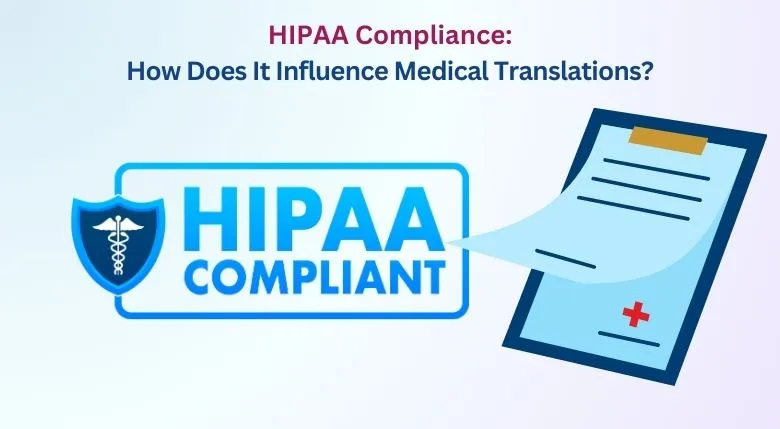
Have you ever needed to translate sensitive medical documents but had reservations due to privacy issues? In the world of healthcare, privacy is paramount. A patient trusts doctors by sharing sensitive medical conditions and, in turn, expects them to keep this information safe. But what about translations when a healthcare provider sends these documents to a linguistic agency? To ensure complete security, it is always advised that sensitive medical documents be handled by translation companies that follow HIPAA compliance.
In this blog, we will explore the impact of HIPAA compliance on the medical translation industry.
What is HIPAA Compliance and Why is it Necessary?
HIPAA, or the Health Insurance Portability and Accountability Act, was enacted in 1996 by the U.S. government to protect individuals’ sensitive health information. This act enforces proper guidelines to prevent unauthorized access of Protected Health Information (PHI). PHI involves sensitive medical records, appointment & treatment schedules, clinical notes and correspondence.
The law is essentially followed by healthcare providers, insurance companies, and other medical institutions.
Additionally, medical translation companies in India should strictly adhere to HIPAA guidelines. Several important documents, like patient diagnoses, medical reports, and patient medical histories, contain PHI and must be protected during translation. These documents risk exposure to unauthorized hands, leading to unwanted data leaks and legal consequences.
The Role of Medical Translation Services in HIPAA Compliance
Linguistic companies that offer accurate medical translation services for medical documents like clinical trial reports, operation procedures, and patient medical history are required to take some necessary steps to adhere to HIPAA guidelines.
Some steps include:
- Training all personnel according to HIPAA guidelines.
- Setting up secure methods for transferring sensitive files.
- Providing encrypted systems to securely store the documents.
- Creating a centralized access control to ensure proper oversight of the translation process.
A HIPAA-compliant medical translation company follows these steps to ensure complete security of PHI during the translation process.
Are you confused about how to choose the perfect medical interpreter? Then explore our blog: Medical Interpreters: How to Choose the Right One?
What Makes a Translation Company HIPAA Compliant?
Any translation company that claims to be HIPAA compliant must provide the following safeguard measures to ensure the total security of PHIs.
- Personnel Training: Every person, be it the linguist or project manager, must undergo proper training to understand HIPAA regulations and guidelines to safely handle PHI.
- Secure File Transfer: A HIPAA-compliant translation company must use reliable file-sharing platforms while exchanging sensitive documents.
- Non-Disclosure Agreements (NDAs): Everyone involved in the project must sign legally binding agreements to ensure the utmost confidentiality of the information they translate.
- Business Associate Agreements (BAA): Translation companies must also sign BAAs with healthcare providers to officially declare their intent to protect PHI and face consequences in the event of a data breach.
- Risk Assessment and Independent Audits: Regular risk assessments and independent audits must be conducted to ensure proper implementation of HIPAA guidelines. This also helps the company to address any weaknesses in data security.
ARE YOU LOOKING FOR PRECISE, TOP-TIER MEDICAL TRANSLATIONS?
Then look no further than Somya Translators’ exemplary linguistic services!
Choosing the Right HIPAA-Compliant Translation Company
When selecting a language service provider for medical translations, especially those involving sensitive health information, it is advisable to partner with a reliable and experienced company. The company must not only have a global reputation but also be committed to HIPAA compliance.
Check out the following considerations before selecting a linguistic partner.
- Verification of HIPAA Compliance: Always ensure the company is well-versed in HIPAA regulations before handing them any sensitive information.
- Check the Experience: A company must have a proven track record in accurately translating medical documentation, especially clinical trial reports.
- Review Data Security Measures: Ask the company about their privacy policy and assess them according to your expectations.
- Request Reference and ISO Certification: A renowned medical translation company must be certified under ISO 17100 and should be able to offer previous work references.
If you are looking to translate sensitive medical documents into different languages without compromising on quality or security, then Somya Translators can be your best choice.
With 16+ years of experience, we offer diverse linguistic solutions for over 170 languages. In addition to our excellence in translations, we follow all the necessary steps according to HIPAA guidelines to ensure your data is always secured.
As a globally recognized medical translation company, we offer some unique and innovative solutions for the healthcare industry, like:
- Forward Translation
- Double Review
- Reconciliation
- Back Translation
- Comparative Review Equivalency
- Clinical Review
- Cognitive Debriefing
- Linguistic Validation for Clinical Trials
- And much more.
So, translate your sensitive medical documents effortlessly and get high-quality results with Somya Translators’ exquisite linguistic support.
Contact us today and get a free quote!







